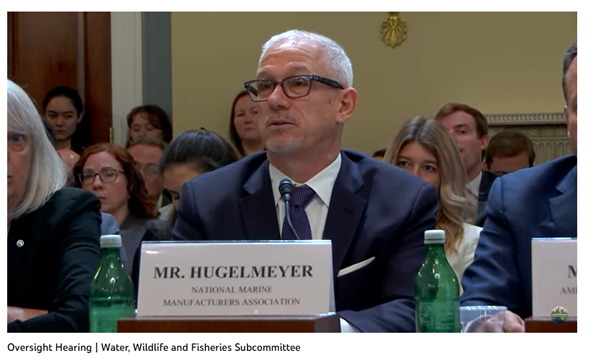NMMA President Testifies at House Natural Resources Subcommittee Hearing on NOAA's Proposed Vessel Speed Restrictions
The U.S. House Committee on Natural Resources, Subcommittee on Water, Wildlife and Fisheries yesterday held an oversight hearing, “Examining the impacts of the National Oceanic and Atmospheric Administration’s (NOAA) proposed changes to the North Atlantic Right Whale Vessel Strike Reduction Rule,” welcoming impacted stakeholders from the $230 billion recreational boating and fishing industry to testify on the devastating impacts NOAA’s proposed vessel speed restrictions would have on businesses, jobs, and coastal recreation across Atlantic seaboard.
The Bureau of Economic Analysis, within the U.S. Department of Commerce, finds the recreational boating and fishing industry is the single largest contributor to the nation’s $862 billion outdoor recreation economy. Despite this, NOAA is proposing sweeping changes to its existing vessel speed rule that will have drastic economic consequences and safety implications for the boating and fishing community, including:
- A mandatory 10-knot (11 mph) speed restriction to include vessels 35 feet and larger (down from 65 feet).
- An expansion of the existing Seasonal Speed Zones (SSZ) to span huge swaths of the Atlantic Ocean, from Massachusetts to central Florida.
- A 10-knot speed restriction up to 90 miles out from shore and in some instances, for up to 7 months of the year.
NOAA’s proposed expansion is a flawed rule that poses drastic economic consequences and boater safety concerns without offering a viable, long-term solution to protect the North Atlantic right whale. Instead, the rule expansion would put $84 billion in economic impact and 314,000 jobs from the recreational boating and fishing industry in Atlantic coastal states in jeopardy, and neglects a balanced, technology- and data-driven approach to protect this endangered species.
“Recreational boaters and anglers are longtime conservationists who share the goal of protecting the North Atlantic right whale and our ocean ecosystems. We’re committed to investing in technologies that do just that. NOAA’s proposed rule would be the largest restriction of Americans’ shared access rights to public waters, would put boaters at risk on the water, and decimate tens of thousands of businesses in coastal communities along the Atlantic seaboard,” said Frank Hugelmeyer, president and CEO of the National Marine Manufacturers Association (NMMA). “Marine mammal protection, economic prosperity and access to our cherished waters can coexist. It’s a false choice to make Americans choose one over the other. Innovative technologies, real-time tracking and monitoring tools offer a more viable solution to protect all whales while allowing for continued recreational marine-related economic contributions along the East Coast.”
Yesterday's hearing shined light on the many glaring inaccuracies and false assumptions NOAA made when putting forth its proposed rule changes. The recreational marine industry is calling for NOAA and Congress to work with the industry to identify a balanced, data-driven and innovative approach to protecting both the North Atlantic right whale and coastal communities, while maintaining public access to our nation’s shared waterways.
For more information, visit coastalrecreation.org, or reach out to Clay Crabtree, director of federal government relations, at [email protected]
